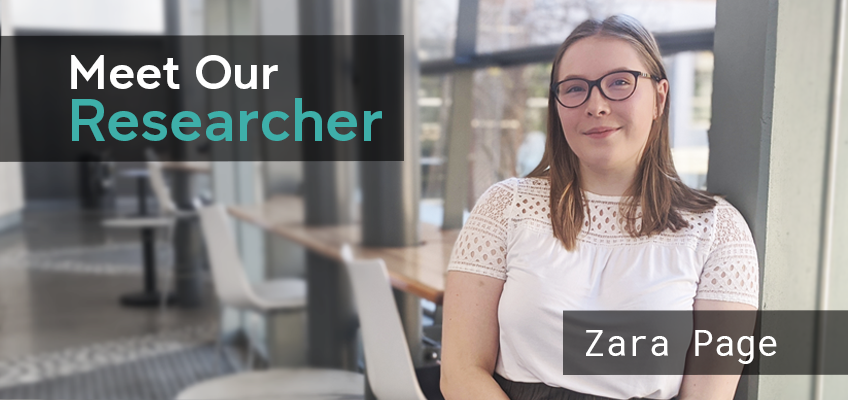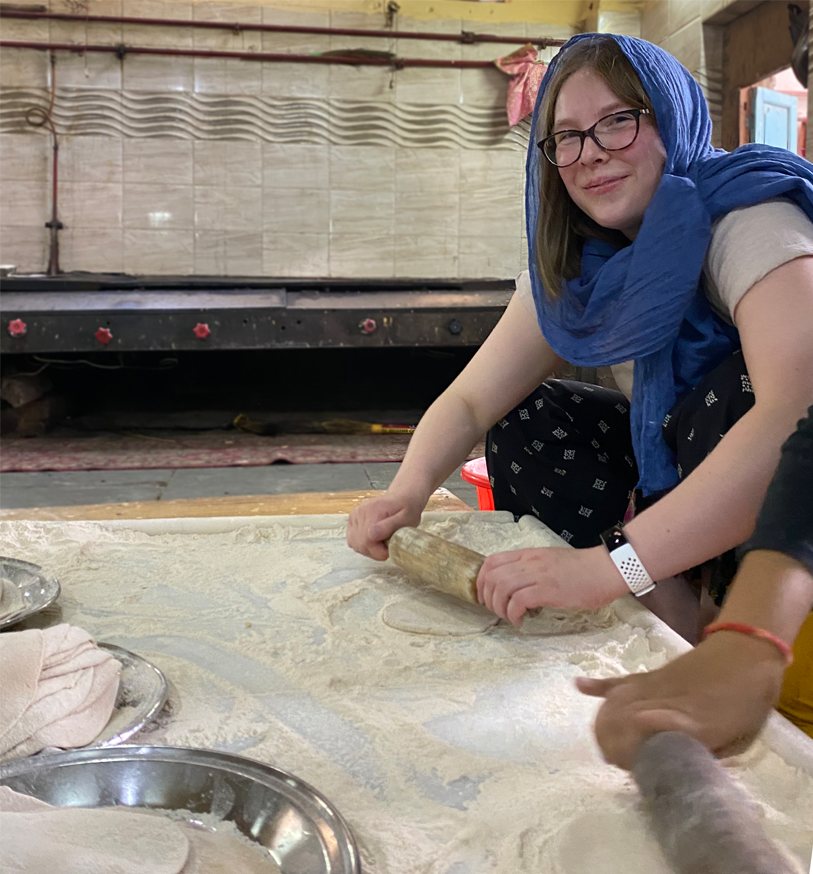13 Oct 2020

Honours Student at CHeBA, Zara Page, keeps mentally fit through her study of differing languages. So far, she has mastered French along with some Italian and Spanish and hopes to move onto learning Mandarin. In keeping with her passion for languages, Zara is currently conducting research exploring the cultural fairness of cognitive assessments for culturally and linguistically diverse Australians.
How did you get into researching the ageing brain?
When I enrolled in my degree, I knew that it was going to be a four-year program with the integrated honours. Ultimately, this was why I chose it; I was really looking forward to the ‘real world’ application of the content. Halfway through our third year we were told to venture into the wild and find a supervisor. I had conducted an internship at the Translational Neuroscience Facility here at UNSW Sydney, working with rats. At the time, it was a very overwhelming decision that seemed as if it would shape my career path. In the end, I decided I was not drawn to this type of laboratory work, so I decided I would go into the clinical and human side. Thankfully, I stumbled upon Dr Nicole Kochan at CHeBA.
Did you experience a ‘defining moment’ which led you to this field?
It was my year 10 work experience that first exposed me to the world of clinical research, so I have come full circle. I was a bit of a nerd and I decided that rather than doing just one week’s worth of work experience, I was going to do a full three across my entire school holidays. I decided this was the best way to work out what I did and did not enjoy. I tried speech pathology and absolutely decided this was not for me; I had no passion for it. Although it involved lots of interaction with people, it was not quite what I was seeking. The second one was occupational therapy which, was once again very interesting, but a bit repetitive for me and was not as creative or diverse as I had hoped. At long last, I spent my third week at the Brain and Mind Centre at the University of Sydney. I spent this week shadowing a researcher and neurologist who were looking into a clinical trial of a computerised intervention for Parkinson’s disease. Getting to witness the clinical side of an illness in conjunction with having interaction with patients and their family members and carers reiterated the transformative impact of research for me.
Undeniably, the human element of what’s behind Parkinson’s was a fundamentally eye-opening experience. Beyond the pathology - as in how this disease affects people - there are complex impacts on all aspects of life.
You cannot just sit people down in front of a computer and say: “there you go, we have a magic cure”. It is the culmination of all of the decisions behind the problem-solving such as sitting in meetings with geriatricians, the work of the neuropsychologists and statisticians as well as software developers, and the corporate company making the program. For me, it was just so exhilarating to see all these people come together and that was exactly what I was looking for.

Do you have any personal interests or activities which are protective behaviours against cognitive decline?
Everyone always says exercise, which is a testament to how true it is! However, complex mental activity is also important - and my personal favourite passion project is learning languages. I had learnt Italian throughout my schooling and thought it was time to branch out. I was fortunate enough to go on exchange to France for 6 months in Year 10. I set off for France only being able to ask for a hot chocolate (this definitely came in handy) and fell in love with the country – mainly the bread and cheese. It was so liberating being able to understand not only a different language but the cultural nuances that came with it. I was very impressed by my host father who could speak 6 languages and naturally my 14-year-old self-set a goal of learning five languages fluently by the time I turned twenty-five! Retrospectively, with merely three years to my deadline I was probably a bit ambitious, but I loved the challenge and it definitely motivated me.
What are you currently researching?
For my thesis I embarked on a rather large project looking at both CHeBA’s Sydney Memory and Ageing Study and CogSCAN data – specifically to look at the neuropsychological assessment of culturally linguistically diverse older Australians. Essentially, I compared face-to-face assessments with the new computerised assessments. My aim was to build off previous studies which had found that face-to-face assessments can disadvantage people from diverse backgrounds to see whether computerised versions would be more culture fair. Interestingly, I found that language and cultural factors have a significant influence on how people performed. It seemed really unfair that for people from such fantastically diverse backgrounds – who could speak up to 5 languages or had lived in many countries – that this actually ends up being a disadvantage. My research aims to see how we can mitigate this disadvantage and make sure everyone, no matter their background, has access to accurate testing.
Why is your research important?
Australia has such a diverse and multicultural population, not only historically but as our population ages. We have such a mix of cultures that define the ways in which we eat, live and communicate. I can only hope this is celebrated well into the future. I think as a country we need to take a step back and look at our healthcare system. Is the healthcare universal and appropriate? Is it meeting the needs of our ageing populations and their diversity?
I think it is critical to address these systemic disadvantages individuals may face when trying to get a dementia diagnosis.
It would be fantastic if we could develop an easy-to-use tool that helps clinicians and researchers alike. By putting this into clinical practice, even with a simple questionnaire, this means that in multicultural countries around the world people with culturally and linguistically diverse backgrounds have access to a timely and accurate dementia diagnosis – not only in Australia.
What do you love about working for CHeBA?
As an undergraduate student I had never done any research before. Being welcomed into an environment with such fantastic supervisors, Dr Nicole Kochan and Dr Karen Croot, was amazing. They were encouraging, always willing to share their time and taught me to be confident with so many new skills which was invaluable to my personal growth as a future researcher! They supported me to the point where I felt capable and competent to take on another three years of my passion to hopefully make a difference to those who need it most.
What is the ultimate hope you have for your research?
I think my ultimate hope is to take all of these factors; the language, culture and human element of being culturally and linguistically diverse and encapsulate them as accurately as possible into a pristine questionnaire that can be used in everyday settings to ensure that all individuals - irrespective of their background - can access the services they need without facing any disadvantage.
This interview was undertaken during the COVID-19 self-isolation period. Zara found that selecting one song a day that embodied her mood was a great way to not only reflect on the challenges and unexpected positives of self-isolation, but to be able to easily share this with family and friends who might be feeling similar. One day might be Billy Joel’s ‘Vienna’ but David Bowie’s ‘Golden Years’ is right around the corner!
Donations are fundamental for critical research to continue following COVID-19.
If you would like to discuss supporting Zara's work specifically, or would like information
on leaving a legacy via a Gift in your Will, please contact h.douglass@unsw.edu.au.

Zara Page has just completed a Bachelor of Advanced Science (Honours) degree. She graduated in 2020 with First Class Honours/Honours Class I, with a major in Neuroscience from UNSW Sydney. Zara enjoyed her studies so much she decided to take it a step further and will be commencing a PhD “Towards achieving culture-fair neuropsychological assessment for mild cognitive impairment and dementia in culturally and linguistically diverse (CALD) older Australians”. Zara was awarded the DCRC PhD scholarship for her upcoming program supervised by CHeBA Co-Director Scientia Professor Henry Brodaty AO, Dr Nicole Kochan and Dr Karen Croot.
